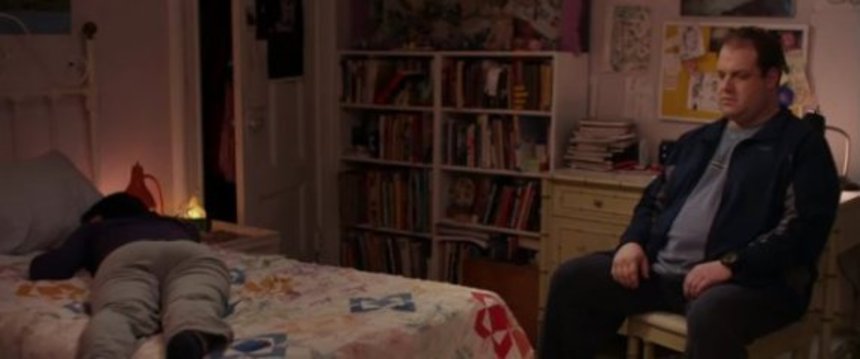London 2011: DARK HORSE Review

All his life, Abe's father told him he was the 'dark horse', someone who seems to be useless at first, but will rise to his full potential when you least expect it. Except now Abe is 35 and that potential is still not realized. Abe at first seems like a rather typical adult nerd, living in awkward adolescence, still with his parents, working for his father, chasing down phone numbers of girls at weddings, and ordering toys on Amazon. He manages to get the phone umber of the beautiful Miranda, who seems screwed up in her own way, barely able to express herself. Abe and Miranda somehow end up getting engaged, but even this does not seem to be enough to bring Abe out of his arrested development.
In any other film, say a typical Hollywood slacker comedy, Abe would be the funny fat friend, quirky but loveable. But Solondz's portrayal might be closer to the truth. Abe suffers from both low self-esteem and a strangely inflated ego. He shows up to work in a tracksuit, both to show his power as the boss' son and as a reflection of his inability to push himself beyond what he sees as his limit. When Miranda (out of resignation rather than affection) agrees to marry him, he knows he cannot live up to this expectation and metaphorically runs away. His jealousy of his handsome, successful brother manifests as petty and childishness. You want to care for Abe, and you do a little, but mostly you feel sorry for him, especially during the few moments when you see what his heart is capable of. In an early scene, Abe tries to explain himself to Miranda; explain what "makes him tick". This is horribly uncomfortable (as well it should be,) and sounds like a motivational speech. It is even sadder when we know that Abe is faking his way through it; or perhaps on some level he really does believe in his potential. Meanwhile, Abe has strange dreams involving his father's secretary and her apparent secret wisdom on the meaninglessness of life.
Some in his life, such as his mother, enable Abe's perpetual adolescence; his father barely speaks to him, and when he does, it is mainly to criticize; and his brother tries to shake him out of his ennui. Only Miranda seems to appear as a beacon of light; but she makes it perfectly clear that she is settling for him, and she has her own serious mental problems. These various threads tie together some great performances, especially by lead actor Justin Bartha, who lets us feel just enough sympathy for Abe that we want things to go his way, and Selma Blair as Miranda, likely the most self-loathing character seen on screen in a long time.
Understatement is the name of the game in this film, and it is in that understatement that Solondz's themes hit like a ton of bricks. Rather than celebrate the man-child, Dark Horse examines him from the creepier side, and how seemingly impossible it is to break out of this role. While certainly not a mainstream film, it is likely Solondz's most broadly accessible film to date, and will hopefully encourage a larger audience for his work.







